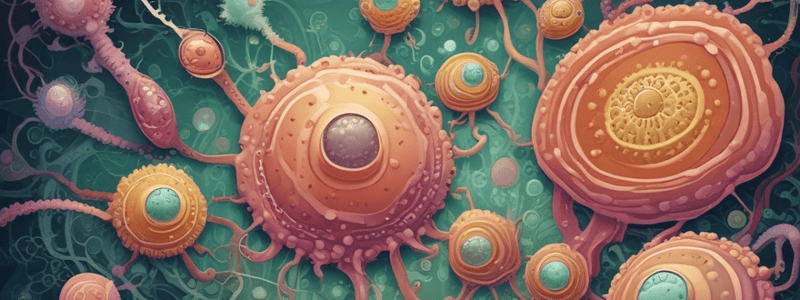Podcast
Questions and Answers
Which of the following statements about spores is NOT true?
Which of the following statements about spores is NOT true?
- They can allow bacteria to exist in suspended animation for centuries.
- They contain a high concentration of calcium bound to dipicolinic acid.
- They contain high concentrations of the essential proteins and ribosomes. (correct)
- They contain a complete copy of the chromosomes.
Which bacteria are known to form spores?
Which bacteria are known to form spores?
- Bacillus and Streptococcus
- Bacillus and Clostridium (correct)
- Staphylococcus and Streptococcus
- Clostridium and Staphylococcus
What purpose does the high concentration of calcium bound to dipicolinic acid serve in spores?
What purpose does the high concentration of calcium bound to dipicolinic acid serve in spores?
- Preventing nutrient entry
- Facilitating cell division
- DNA protection (correct)
- Metabolizing sugars
Which of the following statements about the misuse of antibiotics is correct?
Which of the following statements about the misuse of antibiotics is correct?
Spores protect bacterial DNA from which of the following?
Spores protect bacterial DNA from which of the following?
Flashcards are hidden until you start studying
Study Notes
Spores
- Spores allow bacteria to exist in suspended animation for centuries.
- Spores contain a high concentration of calcium bound to dipicolinic acid.
- Spores contain a complete copy of the chromosomes, but do not contain high concentrations of essential proteins and ribosomes.
- Spores protect DNA from intense heat, radiation, and other environmental stresses.
Bacteria that Form Spores
- Only some Gram-positive (G+) bacteria, such as Bacillus and Clostridium, are capable of forming spores.
- Gram-negative (G-) bacteria do not form spores.
Antibiotic Resistance
- The misuse of antibiotics, including their use in animal feed, selects for resistance mutants, contributing to the development of antibiotic-resistant bacteria.
Studying That Suits You
Use AI to generate personalized quizzes and flashcards to suit your learning preferences.




